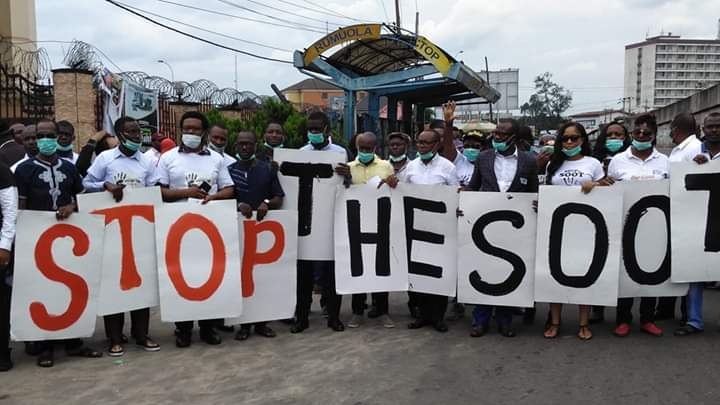
#stop the SOOT CAMPAIGN
Port Harcourt 23.12.17
@Photo credit Oraye St.Franklin
Polluted clouds from burning burning of stolen Crude Oil over Port Harcourt 23.12.17
#StoptheSootCampaign #PlsDontSootMe #
Port Harcourt is the hub of the hydro carbon industry in Rivers State of Nigeria.The residents of the state currently face a delimma of soot eveloping all parts of the state due to diverse reasons as aptly captured by Robin Tombari Sibe.
SOURCES OF THE SOOT: (1) Artisanal Refineries (2) Violent destruction of (1) by Law enforcement agencies (3) Flares from the organized hydrocarbon industry - 2 Refineries, a Petrochemical Complex (which also houses a fertilizer plant), the various gas flares still raging on (4) Burning of tyres (5) Emissions from other industries such as Asphalt Plants, etc (5) Automibiles, Generators and other discrete sources (6) Others
Note: I know you may want to question the fact that we’ve lived with most of these for most, if not all of our lives, how come it’s so palpable now? Well, each contributes in their own way; it’s probably more visible now, because there are these additional sources [(1) and (2) above]
WHO IS AT FAULT/WHAT CAN BE DONE?
(1) Federal Government - The federal government, like they say in local parlance, has both the yam and the knife. There’s a total failure in compliance monitoring and regulation. All the environmental laws and the key agencies are federal - EIA Act, NESREA Act, NNPC Act (wherein DPR derives her legitimacy - they authored the EGASPIN which is the guideline for the environment in the hydrocarbon industry), NOSDRA, HYPREP, etc.
They also control the entire apparatus of state - the Police, Army, Navy, Civil Defense, DSS, etc. The artisanal refiners break the laws, and if we had efficient law enforcement, their trade will not be successful. We should ask them basic questions: who supervises and assists in the logistics of the supply chain of the artisanal refineries? Is it possible that this trade flourish brazenly, without any the agencies compromising?
Also, by our laws, the federal government and her JV Partners own the oil assets. If they secure it, they would have cut the supply of the artisanal refineries. That would solve the problem from the source. They should secure their assets. Period!
Finally, the FG, through the then Acting President, promised that licenses will be given for modular refineries. Beyond the public pronouncements, not much has been done. This is a sociological/socioeconomic approach to providing alternatives to these boys. If you want them to drop this trade, it should be a combinational approach - carrot and stick. Licenses should be given to local communities who can organize themselves properly.
(2) State Government- Although the state government, by the way the laws are structured, are not more than a glorified spectator, however, I blame them for acting helpless. They can come in from the Public Health angle, if the laws prevent them from the environment end. They should put up an activist disposition, to embarrass the FG to action. When the spill happened in the Gulf of Mexico, we all saw how President Obama took up an “activist” role to press on demands for the people. The Rivers State Government (RSMEnv) can do the following:
(a) There was a study done early this year; they should publish it, rather than just share with their federal counterparts. Bring it to the open, so citizens can join them to push for action.
(b) The RS Government current have a cordial relationship with the Rivers contingent at the National Assembly. A bill should be sponsored by the state contingent at NASS to press on for institutional federalism, in this case, specifically in environment. They should lobby to mobilize support. You cannot stay in Abuja to regulate and enforce issues of the environment. States who understand their own local environment be empowered totally to enforce and regulate. It’s not acceptable that an IOC will not allow staff of RSMEnv access to take air quality reading.
(c) Sue the Law Enforcement Agencies for bombing and violently destroying the Artisanal Refineries. This is ecocide, and clearly a Public Health issue, which is Primary to the state.
(d) Lead the sensitization campaign to our communities to discourage them from this illicit and dangerous act. Put together a strategic communication team that can package the message for the different audience categories.
(e) Put pressure on FG to clean up spill sites in the state. Every destroyed artisanal refineries site should be treated as a spill site.
(f) Set up a modern environmental lab (including state of the art air quality drones). Publish environmental findings/reports daily.
(3) Citizens like you and I: We should continue to educate our people. Let them know that the artisanal refineries, apart from the associated health impact, also takes away the livelihood of the locals. It takes several years, often running into decades, for a spill site (or artisanal refining site) to self-recover.
pLANT A TREE
The plant a Tree campaign in Port Harcourt is a response to the depopulation of trees in the city that have turned vast areas into 'Concrete Jungles". A drive from Wimpey Junction to Iwofe Jetty will show not more than 5 trees for an area that was swampy and hosted a deep vegetation.
The city of Port Harcourt is located in the Niger Delta that replete with with pollution arsing from hydro carbon activities like oil spills and flaring of gas, the most impactful on the city of Port Harcourt is the heavy presence of particulate matter or Soot in the air arising from the activities of illegal artisinal refining of crude oil.
The capital intensive nature of the project have cause me to join groups like the Boyz Company of Nigeria and the Rivers State Sustainable Agency to work towards the planting of the initial 1000 trees before the end of 2017.


